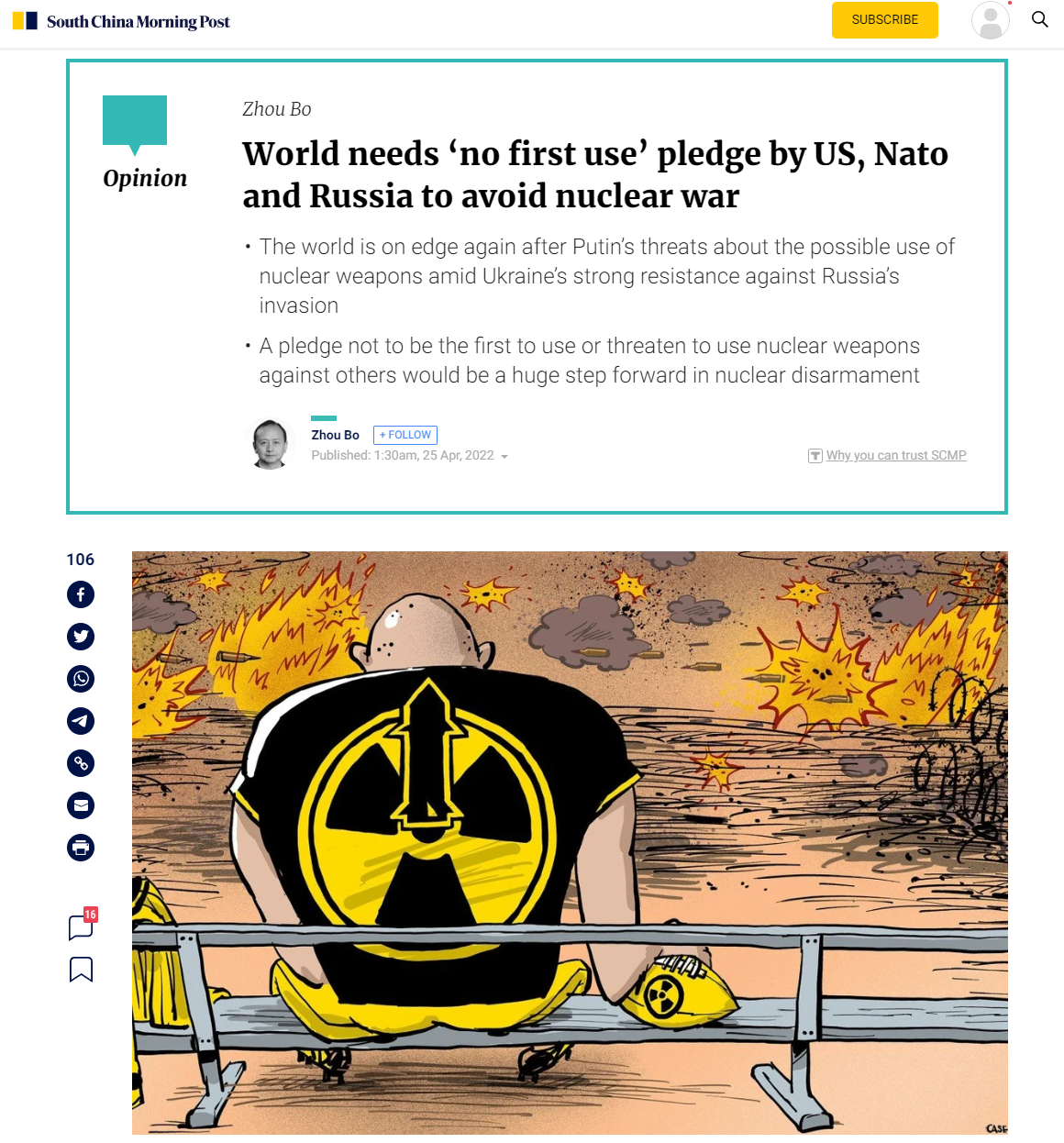Senior Colonel Zhou Bo (ret) is a senior fellow of the Centre for International Security and Strategy at Tsinghua University and a China Forum expert
Nuclear weapons look awfully important again. Given Russian President Vladimir Putin’s not-so-thinly veiled warning of a nuclear attack, it is a fool’s errand to talk about nuclear disarmament now. One can imagine that North Korea thinks it is fortunate to have developed nuclear weapons, and one can only guess which would-be nuclear state might crop up next in Asia and the Middle East.

We are stepping into a nuclear jungle where nukes are like low-hanging fruit swaying enticingly. But if “a nuclear war cannot be won and must never be fought”, as the five nuclear powers vowed in a joint statement in January, then one realistic step is that they pledge not to be the first to use or threaten to use nuclear weapons against each other.
This is possible for all nuclear powers as it won’t compromise their effective deterrence. Since it detonated a nuclear device in 1964, China has pledged a policy of “no first use” of nuclear weapons at any time and under any circumstances. It says its nuclear strategies and policies are the most stable, sustainable and predictable among the nuclear powers.
The US Department of Defence announced last month in its Nuclear Posture Review that it “would only consider the use of nuclear weapons in extreme circumstances to defend the vital interests of the United States or its allies and partners”. Such a view is a step back from US President Joe Biden’s previous position that the sole purpose of the US nuclear arsenal is deterring – and if necessary, retaliating against – a nuclear attack. Such a position is only a stone’s throw from a no first use policy.
The United States can afford to make a no first use commitment more than any other country because it has overwhelming conventional military superiority. One can hardly cite a mission the US could not accomplish with conventional weapons.
The gap between the conventional forces of the People’s Liberation Army and the US military is closing in the western Pacific, but it is difficult to imagine a potential conflict in which the US would have to launch a nuclear strike first against China.
The primary concern over America’s nuclear policy comes from US allies who are worried about their security without the American nuclear umbrella. “Great powers don’t commit suicide for their allies”, as Henry Kissinger is often quoted as saying.
They do not have to worry. Knowing a nuclear strike on any US ally will almost certainly invite a devastating nuclear retaliation, an adversary is unlikely to launch a nuclear strike first. If the US could negotiate a “no first use” agreement with North Korea, it might discourage Pyongyang from further developing nuclear weapons.
Mutual assurance on no first use can serve as the first step in establishing strategic stability between Beijing and Washington. The Pentagon reportedly worries that China could triple its nuclear arsenal to 1,000 nuclear warheads by 2030.
Even if this turns out to be true, China’s nuclear stockpile is still only a fraction of that of the US. To talk about nuclear equilibrium, China would have to drastically increase its number of nuclear weapons or the US would have to reduce its stockpile to China’s level. Neither is possible.
The real challenge is how to get Russia involved. In June 1982, Soviet leader Leonid Brezhnev made the no first use pledge at the United Nations because Moscow was confident about the advantages of its conventional military forces on the battlefield over Nato in Europe. As the Russian conventional military forces deteriorated after the collapse of the Soviet Union in 1989, Russia dropped its pledge in 1993.
If Russia believes its “escalate to de-escalate” strategy has deterred the US from sending troops to intervene in Ukraine, it needs to think again. No matter how formidable nuclear weapons seem, they did not help the US in Vietnam, Iraq or Afghanistan.
They have not helped Moscow in mitigating Ukraine’s strong resistance against Russia’s invasion, either. Instead, Putin’s threat on the possible use of nuclear weapons has severely tarnished the image of Russia. In a 2018 documentary, Putin asked, “why do we need a world without Russia in it?”. The better question is, where would Russia be without the world?
Security in Europe rests on whether Russia and Nato can eventually make a deal. The transatlantic alliance can afford to pledge no first use, even unilaterally, against a Russia which relies on nuclear weapons more than ever. It is hard to imagine why Russia would in any circumstances launch a nuclear strike against a grouping that has 30 member states, including three with nuclear weapons.
In 2001, China and Russia agreed not to be the first to use nuclear weapons against each other or target strategic nuclear missiles against each other. If a similar agreement could be made between China and the US, then reaching an agreement between the US, Nato and Russia would become easier.
Here is a good lesson to learn. In the wake of the nuclear tests by India and Pakistan in 1998, China and the US came to a joint declaration that they would not target each other with their nuclear weapons to demonstrate solidarity. This led to a joint statement among the five nuclear-weapon states in 2000 that their nuclear weapons are not targeted at each other or at any other states.
Critics might argue that de-targeting weapons without verification is only symbolic. But, in the nuclear arena, even symbolism is useful if it holds the nuclear powers morally responsible for the security of others. A pledge of no first use is a huge step forward in nuclear disarmament. It tells us a nuclear weapon-free world, however distant, is still possible one day.
(Originally published on South China Morning Post on Apr. 25, 2022.)
